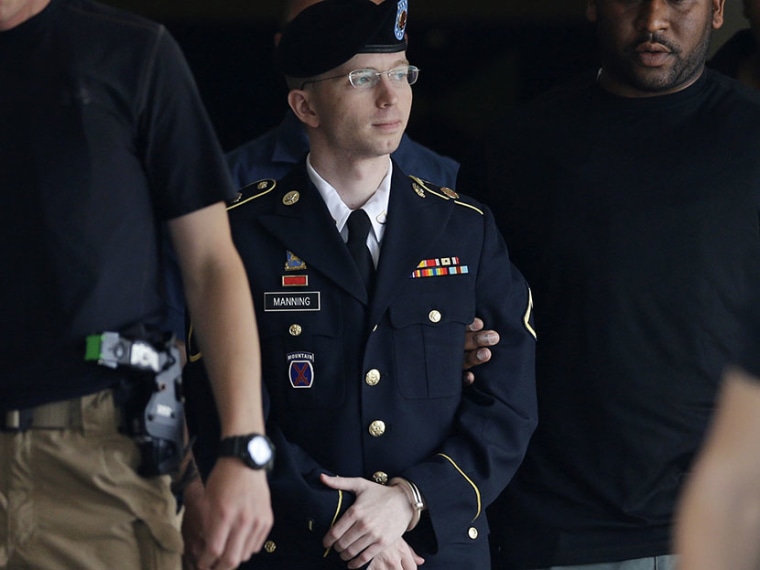UPDATED - Bradley Manning apologized for leaking hundreds of thousands of classified documents to WikiLeaks in a brief statement Wednesday, calling the time he has spent awaiting trial a “learning experience.”
Army Pfc. Manning was found guilty in July of 10 counts related to the leak, including espionage and leaking classified information. His disclosure in 2010 to WikiLeaks was the largest leak in United States history. He pleaded guilty to 10 other charges in February.
He spoke Wednesday as a part of the sentencing phase of his court martial; he faces a possible sentence of 90 years in prison.
"I'm sorry I hurt people. I'm sorry that I hurt the United States," he said. "I'm apologizing for the unexpected results of my actions. The last three years have been a learning experience for me."
Manning also described what he hopes to do after his prison sentence is over. "I hope that you can give me the opportunity to prove, not through words, but through conduct, that I am a good person and that I can return to productive place in society," he said.
This is the first time the 25-year-old has spoken out since a February hearing at which he read a 35-page statement. Manning's sister Casey Major also took the stand to describe the challenges she and her younger brother faced while growing up in an unstable home. "I just hope he can be who he wants to be," she said of his uncertain future.
A military forensic psychiatrist assigned to evaluate Manning testified earlier on Wednesday that the private showed signs of behavioral disorders, NBC News reports. According to Army Cmdr. David Moulton, Manning during his deployment to Iraq considered whether to live the rest of his life as a woman.
The commander said stress would trigger more pronounced abnormal personality traits in Manning. Moulton recounted an incident from April 2010, when Manning was found curled up in a ball, clutching a knife. He later lashed out, striking a fellow soldier, the psychiatrist said.
Col. Denise Lind, the judge in the court martial, is not expected to hand down a sentence until next week at the earliest.
Manning has said he felt disillusioned with a U.S. foreign policy focused on “killing and capturing people” when he released the trove of more than 700,000 documents, battle videos and diplomatic cables to WikiLeaks in 2010. Manning was arrested three years ago and spent nearly the entire first year in solitary confinement.
Manning’s case is at the heart of the Obama administration’s aggressive stance on leak investigations. Under Obama, the U.S. has prosecuted a record number of people for leaking classified information to the public. The administration has also used the 1917 Espionage Act to charge more leakers and whistleblowers than all previous administrations combined.
Prosecutors in the Manning case argued that he effectively provided support to al Qaeda and other terrorist groups when he leaked the documents, and hit Manning with charges of “aiding the enemy.” Manning was acquitted of the charge last month, one that might have carried a life sentence.
